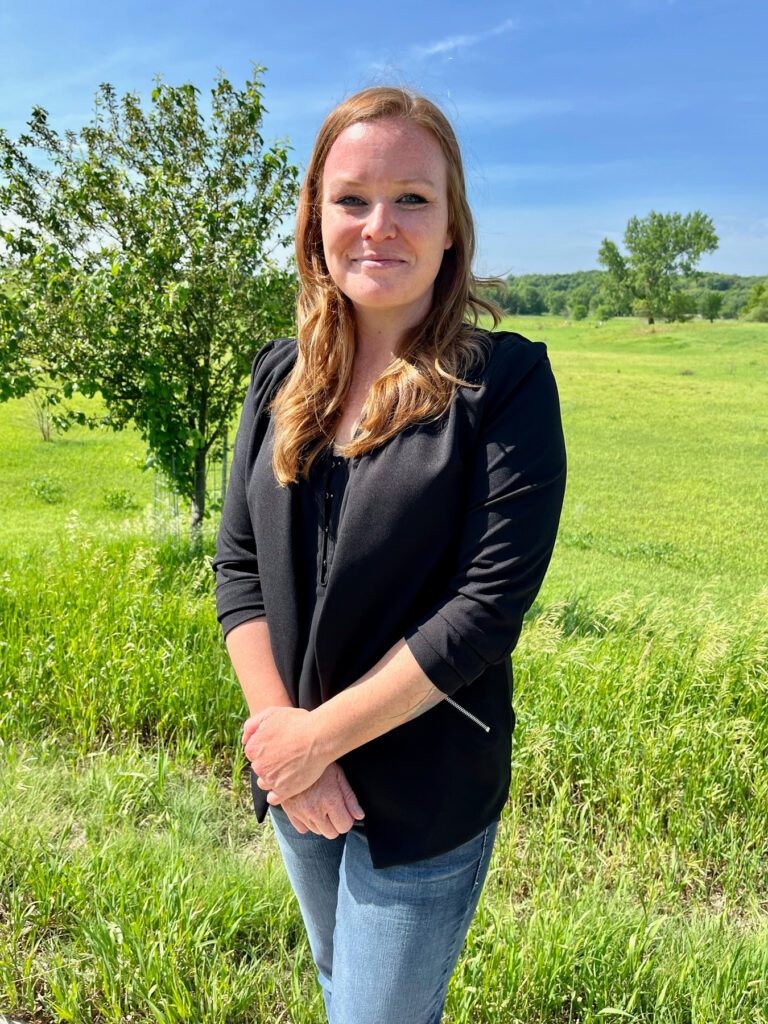By Nicole Grundmeier
Kate Zimmerman proves that you can always go home. And, she is determined to do whatever she can to protect it.
Zimmerman grew up on a farm in Guthrie County, where her parents raised Hereford cattle.
“I was one of four kids, but I was the only outdoorsy kid. So I spent a lot of time on the farm with my dad,” Zimmerman said.
Her grandparents taught her to value nature and to explore Iowa’s wild places.
“They would take me out on hikes to different parks and wildlife areas. My grandma in particular was a huge lover of the spring ephemerals. So we would go out and do those every spring, and I just really fell in love with that side of Iowa. And then as I grew into knowing more about Iowa’s history and our loss of habitat, and our ecosystems, it really just became a passion of mine to help protect Iowa and protect the wildlife and the ecosystems here,” Zimmerman said.

Her three siblings eventually left the state. Zimmerman stayed. She took conservation jobs in Bremer and Ringgold counties.
In late March, Zimmerman, 37, started a new job as executive director of Whiterock Conservancy near Coon Rapids. It stretches into Guthrie, Greene and Carroll counties. The 5,500-acre conservancy is notable for its combined missions of practicing and encouraging sustainable agriculture and conservation, along with providing recreational opportunities.
It’s a legacy of the Garst family and includes the site where Soviet Premier Nikita Khrushchev visited Roswell “Bob” Garst on Sept. 23, 1959. Two years ago, the conservancy land was sold with easements requiring that conservation practices continue.
Recreational activities available to the public at Whiterock include hiking, running, horseback riding, mountain biking, canoeing, kayaking, fishing, stargazing and more.
Whiterock offers educational programs and events, which are vital when so many people are disconnected from nature and from agriculture, Zimmerman said.
“When you’re doing school programs and kids tell you that they don’t know where milk comes from – it comes from the grocery store, right? So I think we’re seeing that disconnect from nature and from the land, and, hopefully, through environmental education and those types of things, we can pull that back.”
Zimmerman said she considers education about milkweed plants and their relationship with monarch butterflies as one of her biggest success stories.
“When I started doing monarch-tagging programs, I would have, like, five people show up. Now I’m not there obviously anymore, but 12 years later, there’d be 80 to 100 people showing up on our tagging programs. And the initial outcry was, of course, “My wife attended your program and now I can’t cut these darn milkweeds” and I get those comments, to 10 to 12 years later, those same individuals are now coming up to me, showing pictures on their phone to me about their milkweed patch and how proud they were.”
We recently caught up with Zimmerman. This Q&A has been lightly edited and condensed for clarity.
Q&A:
What has surprised you about the job so far?
I grew up in Guthrie County, and I was aware of Whiterock, but by the time it really got going, I had already moved on to college and my other full-time career. So coming back to it and now starting here, it’s just the intricacy of all the moving pieces, with the sustainable ag, the natural resource conservation, as well as combining that recreation aspect. So, lots of moving parts, but it’s such a fantastic model of what Iowa can be.
Tell me about your education, and your background. What was your career like before you came here?
I knew early on that I wanted to do the natural resource side of things. So I started my career in high school at Springbrook State Park, and worked there a couple summers and then I attended Upper Iowa University and got my bachelor’s in conservation management and biology. I started full time right out of college with Bremer County Conservation. I did several other internships with different groups, like the Iowa Natural Heritage Foundation, Seed Savers Exchange in Decorah. I did a tour with Fayette County Conservation one summer. Right out of college, I got hired on with Bremer County Conservation as a naturalist. That was my first time doing the education side of things. I’d always done more of the natural resource or park enforcement, park management, those types of things. So that was eye-opening. But I grew to love it, to the point that after I moved on from Bremer County and started my executive directorship with Ringgold County Conservation, they had zero environmental education program when I started there, and we fundraised and built an education center, all on grants and donations, in five years.
You have so many different responsibilities here: fundraising, management, recreation, sustainable agriculture. What would you say is most challenging about juggling all that?
I think land management is always going to be a tough one. There are 5,500 acres of Whiterock and such various ecosystems with the oak savannas, the tall-grass prairie; we have some wetlands, and then of course the ag side of things. That takes a lot of time, but we have fantastic staff. We have a great director of land management, or land stewardship, and she does a fantastic job.
What’s it like for you to now be working and saving land where you grew up?
It was a little strange to come home. I won’t lie. I’ve been in northeast and southwest and kind of all over the place with my career, and probably, if you would have asked me five years ago, I would have never, ever anticipated coming back home. But priorities change and things change. I’m the only child left in Iowa for my parents. And as they get a little older, coming home and being close to them was more and more important. I was really interested in getting into the nonprofit world. So when I was looking at those opportunities, that was a huge component, how close it would be to my parents. So it’s been really fun being back home; the Whiterock board has been amazing and so supportive. It’s been a great jump and a great leap into the nonprofit world.
What is the greatest challenge facing Whiterock right now?
I think you’re going to get the same answer with most nonprofits, and that’s, of course, going to be funding. We’re always very interested in talking with new donors as well as our ongoing supporters. We are so appreciative of everybody that supports us and makes sure that we are here through forever for everybody to enjoy. We have such a unique landscape here at Whiterock that you’re not going to find anywhere else in the state of Iowa, as well as with our unique combination of the sustainable ag, natural resources and the recreation. We are really the best model for our state and what we can do to combine all three of those aspects together.
What do the next five years hold for the conservancy?
We would love to grow staff. We are a small organization still, but we are growing every day. Our guest services get busier and busier. And COVID, of course, increased that tenfold. We haven’t seen it slow down since. In five years, I would hope that we can continue to do all the amazing things we’re doing, and do more on top of that.
How did COVID affect Whiterock Conservancy?
I wasn’t here during the early COVID years, but I was in a similar organization that does similar things. There was nothing to do; people were stuck in their houses. And lucky for us we had those places to go. Iowa was ranked 47th, fourth-worst in the nation, for public spaces, but the fact that we do have what we have still creates a great opportunity for people to get out with our state parks or county parks or nonprofit areas like Whiterock, to have those locations to really escape and get out and still have those opportunities to recreate. I think it made people get out and explore their backyards. Because sometimes we do ignore what’s right next to us.
I know you haven’t been here very long, but what are you most proud of that you’ve been able to achieve since arriving?
I love our team, and team-building is a huge part of being successful. So we have a great staff, and we are really creating that team that’s going to really push Whiterock into the future. I love creating foundation work, making sure that we are a sustainable organization and moving forward that way as well. And fundraising is always fun. We just did a foraged event at Big Grove Brewery in Des Moines. That was really fantastic. And a lot of the meal was foraged right here at Whiterock. They made some weird stuff, and one of my favorites ended up being this asparagus dessert. I was a little leery of it. But it was fantastic. So Big Grove partnered with us along with Lua Brewing, and proceeds from the event came to Whiterock. They’re also doing bison burgers from our bison that we have here at Whiterock, neat farm-to-table-type stuff.
AT A GLANCE: Kate Zimmerman
Age: 37
Hometown: Rural Guthrie County
Education: Bachelor of Science from Upper Iowa University, 2007
Activities/hobbies: Travel, hiking, kayaking, gardening, camping
Contact: kzimmerman@whiterockconservancy.org


